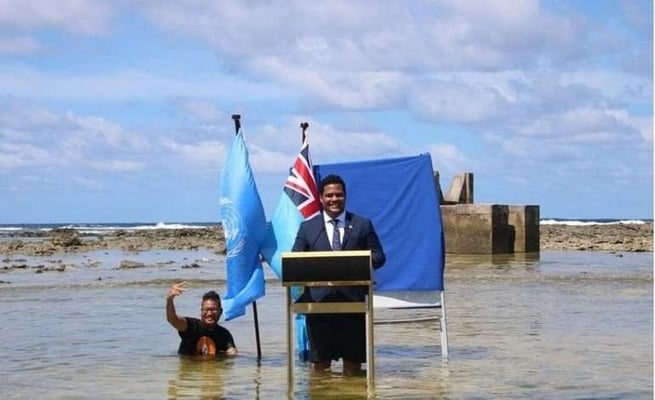Tuvalu minister makes speech in knee-deep water

Tuvalu, one of the world’s smallest nations and one that is most at risk by sea level rise is looking at legal measures to ensure it retains ownership of its maritime zones and recognition as a country even if it is completely submerged due to climate change.
The Foreign Minister Simon Kofe said Tuvalu is looking to the future and preparing for the worst case scenario, where their lands disappear and their people must leave.
Tuvalu's foreign minister did his COP26 statement like no other by speaking behind a podium at sea, standing in knee-deep water. He made his speech at sea to address rising sea levels affecting Pacific nations, such as Tuvalu. The recording was shot by public broadcaster TVBC. Photo: (Photo by EyePress News / EyePress via AFP)
"We will not stand idly by as the water rises around us. We are not just talking in Tuvalu; we are mobilising collective action at home, in our region, and on the international stage to secure our future," he said.
This includes pursuing legal avenues to ensure Tuvalu's existing maritime boundaries remain intact and the country will still be recognised as sovereign even if its land territory is lost.
Kofe made a virtual address at a side event at COP26 saying Tuvalu is living with the realities of climate change and sea level rise.
"We cannot wait for speeches when the sea is rising around us all the time. Climate mobility must come to the forefront; we must take bold, alternative action today to secure tomorrow," he said.
Tuvalu lies to the North of New Zealand about midway between Hawaii and Australia. It is made of three reef islands and six atolls with total land area of just 26 square kilometres.
At its highest, Tuvalu is only 4.6 metres above sea level. It is estimated that a sea level rise of 20-40 centimetres in the next 100 years could make Tuvalu uninhabitable.
Tuvalu, one of the world’s smallest nations and one that is most at risk by sea level rise is looking at legal measures to ensure it retains ownership of its maritime zones and recognition as a country even if it is completely submerged due to climate change.
The Foreign Minister Simon Kofe said...
Tuvalu, one of the world’s smallest nations and one that is most at risk by sea level rise is looking at legal measures to ensure it retains ownership of its maritime zones and recognition as a country even if it is completely submerged due to climate change.
The Foreign Minister Simon Kofe said Tuvalu is looking to the future and preparing for the worst case scenario, where their lands disappear and their people must leave.
Tuvalu's foreign minister did his COP26 statement like no other by speaking behind a podium at sea, standing in knee-deep water. He made his speech at sea to address rising sea levels affecting Pacific nations, such as Tuvalu. The recording was shot by public broadcaster TVBC. Photo: (Photo by EyePress News / EyePress via AFP)
"We will not stand idly by as the water rises around us. We are not just talking in Tuvalu; we are mobilising collective action at home, in our region, and on the international stage to secure our future," he said.
This includes pursuing legal avenues to ensure Tuvalu's existing maritime boundaries remain intact and the country will still be recognised as sovereign even if its land territory is lost.
Kofe made a virtual address at a side event at COP26 saying Tuvalu is living with the realities of climate change and sea level rise.
"We cannot wait for speeches when the sea is rising around us all the time. Climate mobility must come to the forefront; we must take bold, alternative action today to secure tomorrow," he said.
Tuvalu lies to the North of New Zealand about midway between Hawaii and Australia. It is made of three reef islands and six atolls with total land area of just 26 square kilometres.
At its highest, Tuvalu is only 4.6 metres above sea level. It is estimated that a sea level rise of 20-40 centimetres in the next 100 years could make Tuvalu uninhabitable.









Leave a Comment